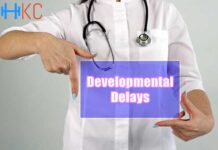
Hernias occur when fatty tissues or organs push through the connective tissue or muscle opening that holds them in place. For instance, the intestines may squeeze through a weak spot in the abdominal wall.
The main cause of hernias is strained or weak muscles. Depending on their cause, they can progress slowly or quickly. Muscle weakness that leads to a hernia may be caused by a wide range of factors, including congenital conditions during pregnancy, aging, chronic coughing, and damage from surgery or injury.
Muscles may also weaken due to obesity, engaging in strenuous exercises, constipation, and abdominal fluids. There are several factors that predispose people to the risk of developing a hernia. These include a family history of hernias, age, smoking, obesity, and being born with low birth weight or prematurely.
Most hernias occur in the abdominal area between the hips and the chest. However, they can also occur in the groin and upper thigh area. Since hernias don’t disappear on their own, surgery is the most effective way to treat them and prevent further complications.
Hernia Surgery
If you go through a surgical procedure to repair a hernia, you can expect to experience pain for several days. You’re also likely to feel less energetic and more tired than usual. While it’s normal for such issues to occur in the days following hernia surgery, you should feel better within seven days.
Depending on the size of the hernia, surgical treatment may involve pushing the hernia back in place, tying it off, or removing it completely before stitching the open skin back. However, large hernias require surgeons to add a flexible mesh to the opening to provide additional support.
Signs To Watch Out For After A Hernia Surgery
If you’ve gone through a hernia mesh surgery, there are several things you’ll need to watch out for as you heal. Here are five of them:
#1. Constipation
Though constipation is a sign of numerous other problems, you need to take it seriously if you experience it after you’ve had a hernia mesh surgery. This is particularly important if your surgery was meant to treat a hernia that had developed along the abdominal wall.
Often, any medical device that’s implanted in this area can pile pressure on the small intestines, stomach, or colon. This pressure can quickly lead to gastrointestinal problems, including interfering with your body’s ability to pass stool and gas.
Constipation is particularly common in patients who develop scar tissue or those with umbilical hernias that cause the intestine to protrude via the belly bottom. If you get constipated even after you increase your intake of fiber, you need to go for a medical checkup before you start experiencing dangerous conditions like hemorrhoids, bloating, and fissures.
#2. A Burning Sensation
If you experience a burning sensation on the surgical site, it could be a sign that the hernia mesh has either shrank, been dislodged, or disintegrated. The burning sensation may also be a sign of an infection. Some patients experience this slowly in increments over time, while in others, the burning appears suddenly.
The burning may also start and disappear just as quickly. This is particularly common in people who are on prescribed antibiotics as the medication will cause the inflammation caused by the hernia mesh to subside. However, the burning is likely to return as soon as the patient stops taking the antibiotics.
#3. Nausea
Though patients with different medical conditions can experience nausea, people who’ve gone through a hernia mesh surgery shouldn’t turn a blind eye if it occurs following the treatment. This is because, for such people, nausea can be an indicator of a more serious problem.
For patients who’ve had a mesh implant in the abdominal area, nausea could be due to mesh migration to the intestines where it may have caused the intestinal blockage. The condition can also occur if the mesh device causes an infection in the stomach tissue. The infection can inhibit digestion, causing you to feel nauseated.
Persistent nausea can cause other health problems, including electrolyte imbalance and dehydration. If you experience nausea or any other flu-like signs after a hernia mesh surgery, you need to see your doctor immediately.
#4. BulgingIn The Surgery Area
Bulging can occur in the area where the hernia mesh is inserted. This is a sign that the device is moving or getting dislodged, which causes inflammation of the body tissue. The bulge can protrude through the skin when it gets to the size of a softball or bigger.
If you notice a bulge in the surgery area, it’s important that you see your doctor because it could be a sign of hernia recurrence. Bulges can also get infected, leading to fluid buildups that rupture spontaneously. In some instances, the bulges grow very fast, while in others they form at a much lower speed.
#5. Persistent Fatigue
While it’s normal for your energy levels to drop in the initial days following the hernia surgery, feelings of fatigue after seven days aren’t normal. Low energy coupled with fever after this period can be a sign that your body’s response to the device isn’t good.
Some patients react poorly to the polypropylene material used to make the hernia mesh device. The poor reaction can lead to oxidative stress that triggers white blood cells to generate an immune response.
Feeling fatigued may also be a sign of inflammation or infection of the surgery site. You’re likely to feel tired as the body works overtime to fight the infection. To keep the infection from spreading further, you need to see your doctor right away.
#6. Flu Symptoms
When you have hernia surgery and your body reacts poorly to the mesh implant, the surgery area will be infected. Your body will then begin to fight the infection.
This will cause you to experience flu-like symptoms including body aches, fever, chills, and vomiting. Fever occurs when your body is attempting to fight bad bacteria. During this time, your white blood cells generate chemicals known as pyrogens that bind with the hypothalamus, the part of the brain that regulates body temperature.
While it’s normal for your body temperature to fluctuate throughout the day, temperatures that are persistently above 100.4 degrees Fahrenheit should be a cause for concern. If you notice that these symptoms persist more than seven days after the surgery, you need to seek medical attention right away.
#7. Pain
One of the common signs of hernia mesh failure is pain. Often, you’ll experience pain in the surgery area or other parts that are affected by the complications of mesh failure. The amount of pain may range from mild or severe to acute pain that ultimately becomes chronic. Guides such as those found at Rolling Paper offer information on chronic pain and also natural ways to relieve pain that can help you to feel more comfortable if you are waiting for further treatment.
While it’s normal to experience pain in the initial days following hernia surgery, chronic pain can be a result of infection, inflammation, organ perforation, or gastrointestinal problems like bowel obstruction.
There are mesh products that are more prone to infection than others. If you suffer an infection following a hernia mesh surgery or revision surgery, you can pursue legal compensation from your surgeons or the company that manufactured the implant device that was used to treat your hernia if you file a hernia mesh lawsuit.
#8. Redness On The Treated Site
It’s normal for the surgery site to have some redness several days after you’ve had hernia surgery. However, this redness should disappear on its own a week after the surgery. If the redness remains or intensifies, it’s a sign that the mesh device is infected.
The color of the skin may vary from red to pink depending on the intensity of the infection. The skin may also feel tender when you touch it, and in some instances, it may have seroma fluid. If you notice this sign, seek immediate medical treatment to keep the infection from spreading further.
#9. Swollen Lymph Glands
Lymph glands play an important role in filtering bad bacteria and viruses in the body by trapping them. This prevents other body parts or organs from getting infected. As such, swollen lymph glands can be a good indication that bacteria or viruses are present in the body.
If you’ve had a hernia mesh surgery and you start to have swollen lymph nodes, it’s a sign that your body’s fighting an infection. You need to see your doctor right away if you notice that your groin, neck, or armpit lymph nodes are swollen.
Final Thoughts
Hernia surgeries are expected to show signs of healing a few weeks after the surgery. However, this isn’t always the case as people’s bodies react differently to mesh implants. Watching out for the signs discussed above is the surest way of telling whether you’re healing well or not.
If you experience any of them after the initial seven days have passed, you need to consult your doctor right away. When left untreated, infections that develop following a mesh implant can result in hernia recurrence and delayed healing. You may also suffer chronic pain or require additional surgery to remove the mesh implant. This poses a serious health risk. In severe cases, the infections can cause sepsis, cancer, adhesions, and even death.











































